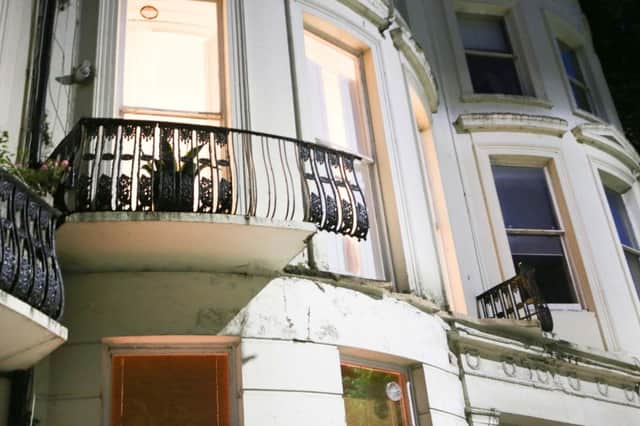Warning for those renting out '˜party accommodation' in city


That’s according to East Sussex Fire and Rescue Service, which has urged landlords to check the safety of short-term holiday lets and party accommodation to prevent any future incidents or accidents.
The fire service said Brighton and Hove’s ‘thriving tourist industry’ meant large-group holiday and party lets are a popular choice for people visiting the area. But it warned that a relaxing getaway can rapidly turn into a disaster if correct fire and safety standards have not been implemented by those legally responsible for the property.
Advertisement
Hide AdAdvertisement
Hide AdThis comes after an incident on Montpelier Road in July last year. Four people who had rented a property from a short-term letting website were injured when a decorative balcony collapsed.
Amy Reynolds, East Sussex Fire and Rescue Service’s business safety manager for Brighton and Hove, said: “Quite a few of the properties around the city have these types of balconies, they are more of a decorative feature than a place to stand or sit. Over the years they can sometimes crack, allow water in and subsequently get weaker.
“We would like to remind the local community of the hazards associated with balconies that are not necessarily constructed for the purpose of sitting or standing on.”
Following the balcony collapse, the fire service wanted to remind those in the short-term holiday letting business to consider carefully the safety of guests using their premises.
Advertisement
Hide AdAdvertisement
Hide AdThe service said previously, a group of letting agents and owners had worked with fire safety specialists to improve the safety of their properties. This enabled the agents to learn about legal requirements for these properties, including which smoke alarms are best suited and what improvements they can make, to ensure that in case of fire everyone can safely escape.
Ms Reynolds said: “We have been very encouraged by the way some letting agents and owners have taken on board our advice and we hope that other people in the same business take note and follow their lead.
“We appreciate that providing people with holiday accommodation can be a rewarding experience both personally and financially but with it comes a legal responsibility to ensure the health and safety of those that you are renting to.
“These properties are of particular significance to the fire service because the people staying inside may not know what to do in case of an emergency and so reducing the risk of a fire or other emergency in the first place is of great importance.
Advertisement
Hide AdAdvertisement
Hide Ad“The service takes its role in protecting its community very seriously and will visit such premises and enforce fire safety law where necessary.
“Where the service encounters premises that fall well below expected standards and place people at risk, it may prohibit or restrict the use of such premises, or even prosecute those responsible for the failings.
“Additionally, where fire safety inspectors encounter such premises not previously known to the service, they will inform partner authorities responsible for enforcing building and planning regulations.”
Key safety points from the fire service:
- Premises that are let as short-term self-catering holiday accommodation must be provided with appropriate fire safety measures.
Advertisement
Hide AdAdvertisement
Hide Ad-It is the duty of the responsible person (normally the owner or managing agent) to carry out a suitable and sufficient fire risk assessment.
- A fire risk assessment should identify all risks and hazards from fire and detail any required improvements, or additional measures required, to reduce the risk.
- All interested and relevant parties (including guests) should be informed of any significant findings of the fire risk assessment so that everyone can play their part in making and keeping the premises safe from fire.
- Guests should be made aware of how fires may start so that they can reduce the risk by doing such things as turning cookers off, unplugging appliances, or not wedging fire doors open.
Advertisement
Hide AdAdvertisement
Hide Ad- Key areas to consider within the fire risk assessment include; the suitability and testing regimes of the fire alarm and emergency lighting systems, the suitability of the escape routes (stairways/corridors), the information provided to guests within the information pack (the escape plan and the do’s and don’ts for guests to keep them safe).
To ensure sure your property adheres to safety regulations, visit: http://www.esfrs.org/business-safety/